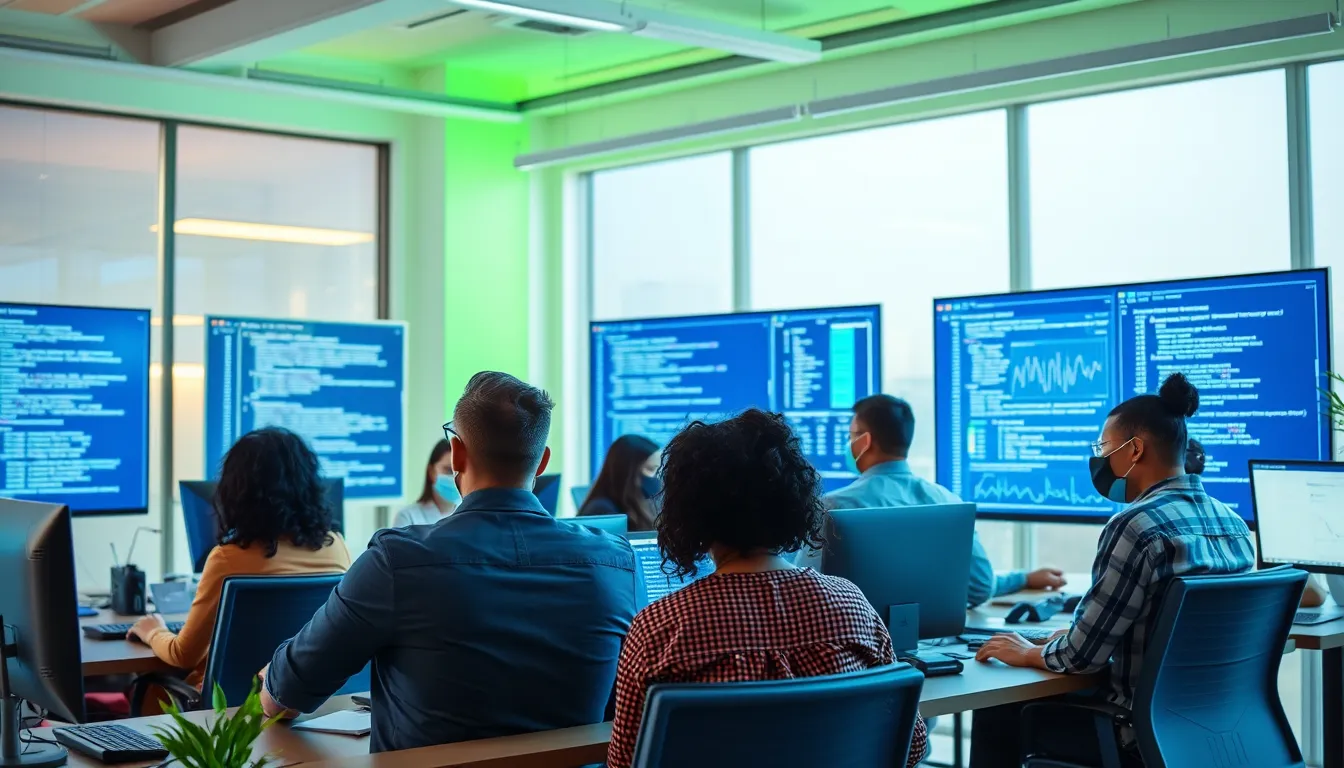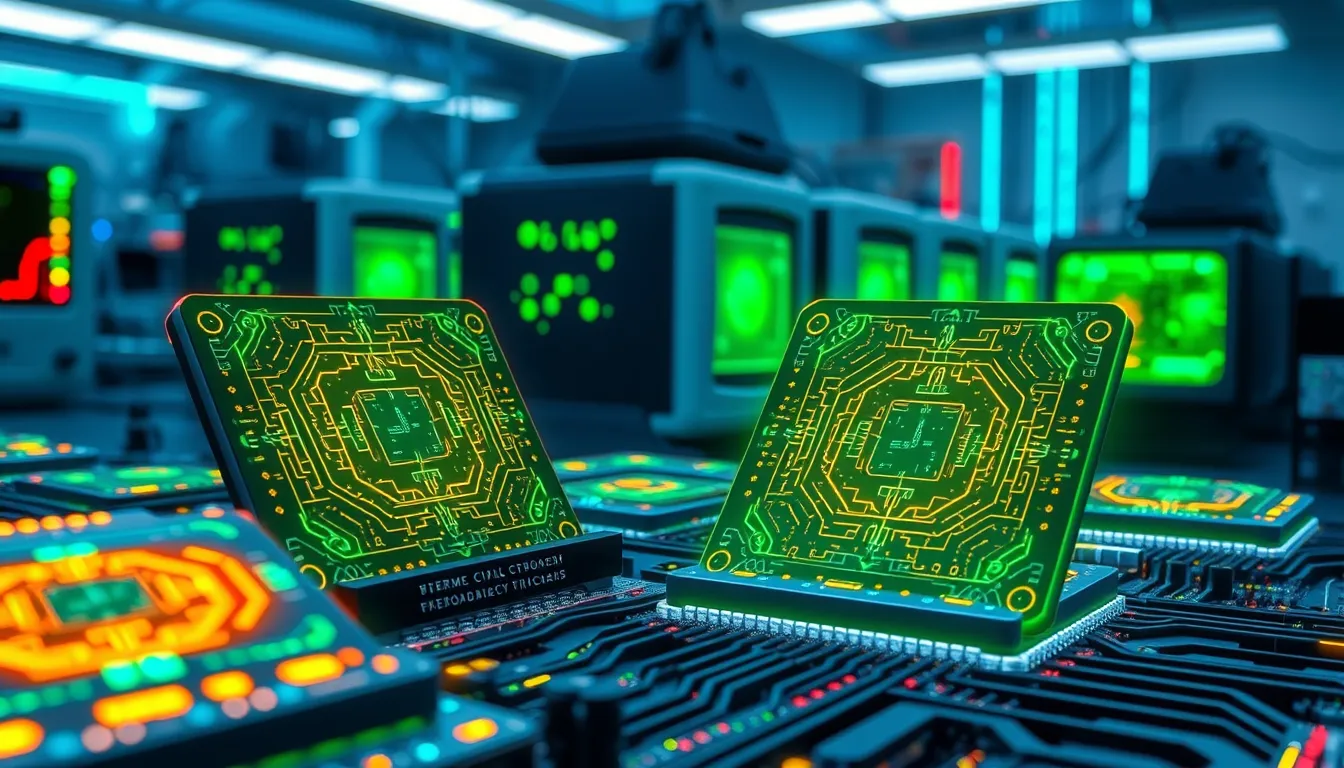Now Reading: Optimizing AI in Software Development: Fast, Reliable Coding
-
01
Optimizing AI in Software Development: Fast, Reliable Coding
Optimizing AI in Software Development: Fast, Reliable Coding

Optimizing AI in Software Development: Fast, Reliable Coding
In today’s rapidly evolving technology landscape, the integration of artificial intelligence (AI) into software development is not a mere trend—it is a transformative shift that redefines how developers approach coding, debugging, and workflow management. As teams embrace AI-driven development tools, they are equipped to manage greater complexities in software engineering while achieving unprecedented efficiency and quality. This shift has far-reaching implications, stimulating a re-evaluation of traditional development paradigms and paving the way for a future where human creativity and machine precision coalesce.
The Evolution of AI in Software Development
Historically, software development was a process dominated by manual coding and extensive human oversight. Developers wrote code from scratch, manually debugging and reviewing every line. However, the emergence of AI in software development has ushered in a new era where repetitive tasks, error detection, and even aspects of code design can be automated. The evolution has been driven by advancements in machine learning algorithms, natural language processing, and pattern recognition technologies that allow AI to understand code context and predict potential issues before they escalate.
Modern development teams are now leveraging these sophisticated AI systems to tackle routine coding tasks, freeing up human developers to focus on creative problem-solving and complex design challenges. This collaboration between human ingenuity and automated efficiency has led to faster turnaround times and improved overall code quality.
Key Benefits of AI-Driven Development Tools
The advantages of integrating AI into software development are multifaceted. Below is an overview of some key benefits:
- Enhanced AI coding and AI debugging capabilities: Advanced algorithms can automatically detect errors, suggest corrections, and even refactor code to enhance performance.
- Integration of code review automation: By automating code reviews, AI tools help maintain consistency and adherence to coding standards, reducing the likelihood of human oversight.
- Streamlined workflow automation: AI-enabled project management tools facilitate coordinated teamwork, optimize resource allocation, and ensure that development cycles remain on track.
These benefits not only streamline the development process but also ensure that the final output is robust, scalable, and maintainable. By automating mundane tasks, developers can dedicate more time to strategic initiatives and innovative projects that drive competitive advantage.
Deep Dive: How AI Enhances Coding Efficiency
1. Automating Routine Code Generation
AI in software development has revolutionized how routine coding tasks are handled. Traditionally, developers would spend a considerable amount of time on boilerplate code, which is repetitive and error-prone. AI systems can now generate such code automatically, ensuring not only consistency but also reducing the possibility of human error. By leveraging machine learning models trained on vast code repositories, these systems provide developers with a strong starting point, allowing them to refine and optimize the generated code further.
2. Real-Time Code Suggestions and Autocompletion
During coding sessions, AI-powered integrated development environments (IDEs) offer real-time suggestions that significantly enhance code accuracy and efficiency. These suggestions go beyond basic syntax corrections; they can also identify potential logic errors and propose optimized approaches. This immediate feedback loop enables developers to write cleaner code, reduce debugging time, and ensure that the code adheres to best practices.
3. Advanced Debugging Capabilities
Debugging is a critical aspect of software development that can sometimes be time-consuming and complex. With AI-driven debugging tools, developers can identify and resolve issues much faster. These tools analyze code behavior and historical bug patterns, enabling them to predict and flag problematic code segments. Moreover, advanced debugging systems can simulate different runtime scenarios, providing developers with insights into potential vulnerabilities or performance bottlenecks before the code is deployed.
4. Performance Monitoring and Predictive Analysis
Beyond coding and debugging, AI in software development plays a crucial role in monitoring application performance. By continuously analyzing code performance in real time, AI systems can detect anomalies that might otherwise go unnoticed. These insights help in preemptively addressing issues that could potentially lead to system failures, thereby ensuring a more stable and reliable software environment.
Integration of Code Review Automation
Automated code review is another key benefit provided by AI technologies. Code reviews are essential for ensuring that software maintains high standards of quality and consistency. However, manual reviews can be tedious and prone to error, especially when dealing with large codebases. AI-driven code review tools assist by automatically scanning code for common errors, ensuring adherence to coding standards, and even highlighting areas of potential improvement.
By integrating these code review tools into the development workflow, teams can achieve several benefits:
- Improved Consistency: AI algorithms apply the same rigorous standards across the entire codebase, minimizing variations that could lead to vulnerabilities.
- Faster Turnaround: Automated reviews significantly reduce the time developers spend scanning and revising code, accelerating the entire development cycle.
- Enhanced Learning: For less experienced developers, AI reviews offer immediate feedback and learning opportunities, fostering a culture of continuous improvement.
Enhancing Workflow Through AI Integration
In addition to coding and debugging, AI in software development is instrumental in optimizing overall workflow management. Modern project management tools now incorporate AI to forecast project timelines, allocate resources more effectively, and balance workloads. This type of automation ensures that projects remain on schedule and that potential roadblocks are identified early in the development process.
For example, AI can analyze historical project data to predict future timelines, allowing managers to adjust deadlines and reallocate resources more efficiently. In essence, these systems assist in transforming raw data into actionable insights, ultimately driving better project outcomes and fostering improved collaboration amongst team members.
How Developers Use AI for Faster Coding
Developers have been quick to embrace the benefits offered by AI tools. In practice, the implementation of these systems has led to several observable trends:
- Automated Task Management: AI tools take over mundane coding tasks, enabling developers to focus on complex logic and problem-solving. This shift not only leads to more innovative solutions but also helps in reducing burnout among developers.
- Real-Time Performance Analytics: Developers monitor code performance continuously, thanks to AI systems that provide in-depth analytics. This allows teams to identify and rectify potential issues before they exacerbate into larger problems.
- Collaborative AI-Human Interactions: By offering suggestions and improvements, AI tools facilitate a dynamic interaction between the system and the developer. This collaboration ensures that best practices are consistently followed and that the code remains both robust and flexible.
These practices highlight the practical benefits of AI in software development—it accelerates coding processes while maintaining a high standard of quality and reliability. Moreover, as these tools evolve, developers are likely to encounter even more innovative features that further streamline their workflows.
Balancing Automation with Human Oversight
Despite the significant advances in AI, human oversight remains an indispensable component of software development. While AI can automate many aspects of coding, it still lacks the nuanced understanding of context that human developers bring to the table. Therefore, the ideal development environment is one where AI serves as an augmentation tool rather than a complete replacement.
The Role of the Developer
Developers must exercise critical judgment when integrating AI-driven suggestions into their projects. Human oversight is essential to ensure that automated processes do not unintentionally introduce errors or biases into the code. The strategic interplay between AI-generated automation and human expertise creates a resilient development process capable of adapting to dynamic project requirements.
Maintaining Creative and Critical Input
In situations where AI handles routine tasks such as error detection or code optimization, human developers can focus on higher-order thinking and creative problem-solving. This balance is crucial as software development is not solely about writing code—it also involves innovative thinking, strategic planning, and intuitive decision-making that machines are not yet capable of fully replicating.
Ensuring Robust Security and Ethical Considerations
Another critical aspect where human oversight is paramount is in security and ethics. As AI systems process and generate code, developers must remain vigilant against potential vulnerabilities and ethical lapses. Embedding robust security measures and ethical guidelines into the development process ensures that AI-assisted coding remains beneficial and trustworthy.
Case Studies and Real-World Applications
To illustrate the transformative power of AI in software development, several case studies highlight how organizations are successfully integrating these tools into their workflows:
Case Study 1: Large-Scale Enterprise Application
A multinational company integrated AI-driven development tools to overhaul its legacy software. The result was a 40% reduction in development time and a significant improvement in code quality. The automated code reviews and real-time debugging systems were particularly impactful, leading to higher reliability and faster time-to-market for critical features.
Case Study 2: Start-Up Innovation
A technology start-up incorporated AI tools to manage rapid iteration cycles during product development. By automating repetitive coding tasks and streamlining code reviews, the start-up was able to focus on innovative design aspects and customer-centric features. This agile approach enabled it to disrupt established markets with fresh, reliable solutions.
Case Study 3: Open Source Collaboration
In the open source community, AI-driven tools have been instrumental in managing large-scale collaborative projects. With contributors from diverse backgrounds, maintaining consistent code standards becomes challenging. AI systems help by automating code quality checks, thus maintaining a high standard without impeding the creative contributions of developers worldwide.
Future Trends in AI-Driven Software Development
The journey of integrating AI in software development is only beginning. Looking ahead, several emerging trends promise to further enhance the role of AI:
- Increased Personalization: Future AI tools are expected to deliver highly personalized coding assistance based on individual developer styles and project requirements. This will lead to even more efficient workflows tailored to specific needs.
- Enhanced Collaboration Platforms: As remote and distributed teams become the norm, AI-driven collaboration platforms will evolve to support seamless, real-time communication and project management.
- Expanded Predictive Analytics: With advancements in data analytics, AI will play an even larger role in forecasting project challenges, resource allocation, and long-term maintenance issues, further minimizing risk.
- Greater Emphasis on Ethical AI: As AI becomes more influential in development decisions, a strong focus on ethical implications and transparency will drive the evolution of these systems, ensuring they are used responsibly and inclusively.
Conclusion
The integration of AI in software development marks a significant milestone in the evolution of technology. By automating time-consuming processes such as coding, debugging, and workflow management, AI enables developers to unlock unprecedented levels of productivity and innovation. However, as promising as these advancements are, they also underscore the importance of maintaining a balanced approach where human oversight remains central to the development process. The synergy between automated tools and human expertise not only addresses the immediate challenges of modern software development but also lays the foundation for a robust, agile, and future-ready development ecosystem.
Organizations that successfully combine the power of AI with the nuanced judgment of experienced developers are well-positioned to lead in an increasingly competitive market. The focus on fast, reliable coding is not just about efficiency—it represents a broader commitment to quality, security, and ethical innovation in software development. As AI continues to evolve, we can expect even more groundbreaking tools and methodologies, ensuring that the development landscape remains dynamic and responsive to the ever-changing demands of the digital age.
In summary, embracing AI in software development is a strategic imperative. It enables rapid iteration, improves code quality, and ensures that development teams remain agile and competitive. With continued advancements and thoughtful integration of AI, the future of software development promises to be not only faster and more reliable but also more secure and ethically sound, ultimately driving a new era of technological innovation.

























